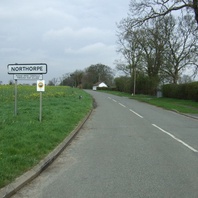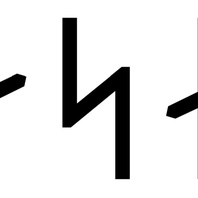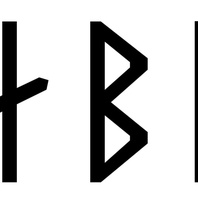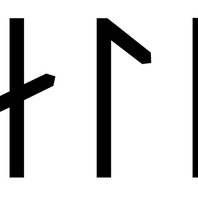
Viking Names
Conisholme
Conisholme, in the South Riding of Lindsey in Lincolnshire, comes from Old Danish kunung ‘a king’ and Old Norse holmr ‘an island, an inland promontory, raised ground in marsh, a river-meadow’. The name is topographically appropriate, though what king is evoked by it is uncertain. However, the village of Coningsby, also in the South Riding of Lindsey, is recorded in Domesday Book as having been owned by the king.
Read More

Viking Names
Northorpe
Northorpe, in the West Riding of Lindsey of Lincolnshire was originally a simplex place-name from Old Norse þorp ‘outlying farm, settlement’. Old English norð ‘north, northern’ was prefixed to distinguish Northorpe from Southorpe, which is now a deserted medieval village.
Read More

Viking Names
Perlethorpe
Perlethorpe, in the Bassetlaw Wapentake of Nottinghamshire, was originally a simplex name from the Old Norse element þorp ‘outlying farm, settlement’. The first element derives from the family name Peverel and was added at a later date possibly because the estate became associated with this family. Perlethorpe is a joint parish with Budby.
Read More

Viking Names
Hunhild
Húnhildr is a postulated Old Norse female name of possible Anglo-Scandinavian origin. The first element of the name is Hún- of doubtful origin either from Old Norse húnn ‘bear-cub’ or perhaps Primitive Scandinavian hūn ‘high’. The second element of the name is –hildr ‘battle’. The name appears to be the first element in the field-name Hunildehus in Wildmore, Lincolnshire, which was recorded c. 1200.
Read More

Viking Names
Cadeby
Cadeby, in the North Riding of Lindsey of Lincolnshire, comes from the Old Norse male name Káti and Old Norse bý ‘a farmstead, a village’ Cadeby is a joint parish with Wyham.
Read More

Viking Names
Thorwif
Þorwīf is a postulated Anglo-Scandinavian hybrid name formed from the Old Norse element Þor– from the god Þórr ‘Thor‘ combined with the Old English element wīf ‘woman, wife’. Forms of Þorwīf are attested in medieval Yorkshire charters.
Read More

Viking Names
Asa
Ása was a common name throughout Scandinavia, including quite a few examples in Swedish and Danish runic inscriptions, but used fairly sparingly in Iceland. There are three examples in Domesday Book for Yorkshire. It is a short form for Old Norse names in Ás- from áss, óss ‘a god’.
Read More

Viking Names
Api
Api is an original byname meaning ‘fool’. It is possibly found in the Norwegian place-name Apnes and there are a few instances in Old Danish, including perhaps, the runic forms abi and aba, although these forms may rather derive from Abbi or Æbbi. It is the first element in Apedale, North Yorkshire and Apethorpe, West Yorkshire.
Read More

Viking Names
Snip
The Old Norse byname Snípr may be related to Modern Norwegian snipa ‘miser, unsociable person’. A single instance is recorded in Norway in 1335. It is also the first element of the place-name Snibstone, Leicestershire.
Read More

Viking Names
Ali/Alli
It is not possible to determine whether the names in Lincolnshire derive from Áli or Alli so all information for both names appears on this page. Áli is a diminutive name and occurs in Old West Scandinavia but it is not really frequent although it occurs as the first element of Norwegian place-names. It also appears in a few Danish place-names, but is not found in documents except for the Latin form Anulo. Alli is a short form of a compound name in Alf- or Al-. It does not occur independently in Old West Scandinavian but is found in a few Norwegian place-names. There are several instances in Old Danish including Latin Allo and a number of runic examples in both Denmark and Sweden. Áli or Alli is the first element of the place-names Aylesby, Althorpe, and Ailby in Lincolnshire.
Read More

Viking Names
Viking
The male name Víkingr is recorded in some eighteen Viking Age runic inscriptions from Denmark and Sweden, and there is evidence it was used in Norway in the Viking Age and even later. It probably derives from the appellative (common noun) víkingr, the meaning of which varies through time and in the different sources. In Lincolnshire, the place-name Wickenby is formed of either the name or the appellative plus Old Norse -by ‘farm, settlement’. In Leicestershire, the element is combined with Old English tun in Wigston Magna (while Wigston Parva has a quite different origin), and is thus a hybrid name. In this case, the parallels with other hybrid names suggest that the personal name is more likely than the appellative as the first element.
